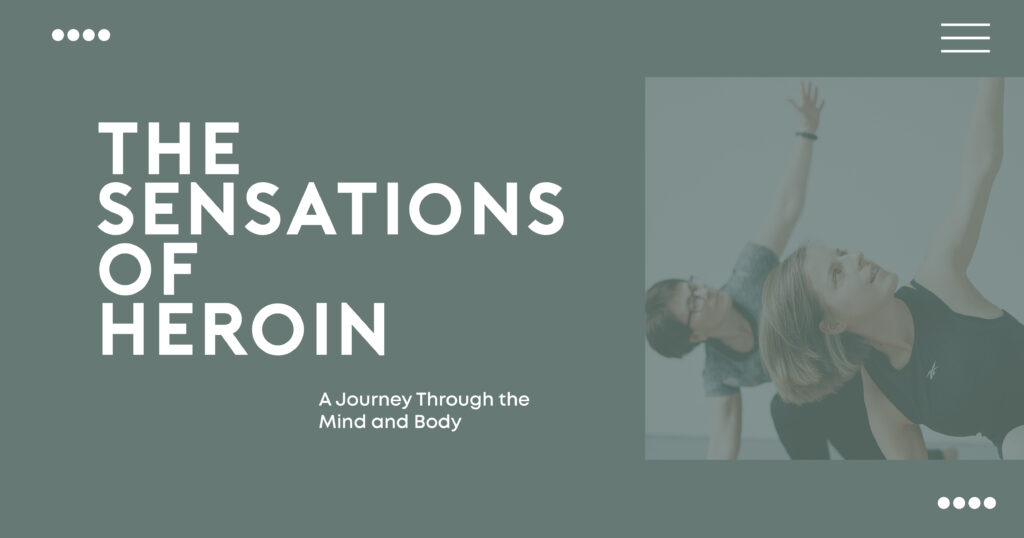To know how it feels to be on heroin, one should not merely describe it but go further. It is an in-depth investigation of the mind and the body – a study of the ways in which just one substance may change people’s emotions, perception, and even self-awareness.
Heroin is a strong opioid alkaloid derived from morphine, and it has a variety of effects that users commonly refer to as a combination of euphoria, coziness, sleepiness, and relaxation. These temporary delights, however, hide the very deep threats and side effects that come with its use.
We also feel that education is the initial step in the process of recovery at Tennessee Behavioral Health. This blog discusses what it really feels like to use heroin and why the awareness of these experiences is a key to the prevention of addiction and a timely response.

The Euphoric State: An Overview
The most noticeable and first effect of heroin is euphoria, a strong well-being of joy, almost overwhelming. This sensation happens when opioid receptors are attacked by heroin in the brain, which results in a rush of dopamine. According to the users, it is a wave of joy that erases pain and worry with the feeling of total satisfaction.
A few moments under heroin will make one think that they are free of anxiety, sadness, and even reality. However, this feeling is false. The euphoric feeling may be temporary between a few seconds and several minutes, but then emotional instability and increased addiction to the drug to present a normal self.
The National Institute on Drug Abuse (NIDA) claims that this artificially induced pleasure reconfigures the reward system of the brain, making normal pleasures, such as a conversation or a meal, seem less pleasurable. With time, the brain demands heroin to a greater extent, and this creates a vicious circle of abuse and withdrawal.
Tennessee Behavioral Health
Experiencing the Rush: What It Means and Why It Happens
One of the characteristics of heroin use is the rush. It happens nearly right after injection, inhalation, or snorting. Users tend to refer to the rush as a wave of pleasure surging through the body – some sudden, forceful burst of satisfaction and reprieve.
This occurs physiologically, since heroin quickly goes across the blood-brain barrier and is changed to morphine. This activates opioid receptors which affect the emotion, pain, and pleasure. The rush is also accompanied by a fast pulse, flushed skin and feeling light-headed.
The Sensation of Warmth: Causes, Triggers, and Effects
Once the rush has passed, a particular warm feeling runs through the body – it is usually referred to as a warm and comfortable feeling. It is a physical and psychological warmness, because the blood vessels are stretched, and the body temperature is slightly raised. To most people, this feeling is some kind of emotional relief.
It substitutes loneliness, grief, or pain with a false sense of security. But, you should realize that this warmth is an effect, not a cure – the suppressed activity of the neural system and reduced metabolism.
| Sensation | Cause | Emotional Interpretation |
| Warmth in limbs | Vasodilation caused by opioid interaction | Feels like safety or comfort |
| Tingling skin | Increased dopamine and serotonin levels | Feels euphoric or intimate |
| Slowed breathing | Depressed central nervous system | Feels peaceful but dangerous |
Although the warmness is relaxing, it is a component of a greater deception, a ruse of the mind that covers the toxicity of the drug. Mayo Clinic claims that long-term use of opioids impairs both natural temperature regulation and the respiratory system, which raises the chances of hypoxia and heart disease.
Understanding Drowsiness: Its Triggers and Mental Impact
The drowsiness comes after the euphoric and warm stages. Heroin also causes a semi-conscious condition commonly referred to as nodding, in which the user falls asleep and awakes every now and then. This is due to the fact that heroin slows the central nervous system down so that an individual is not alert enough, and their thinking ability also becomes sluggish.
The sensation of sleepiness may be misleading, since the mind switches between the states of being awake and dreaming. Nevertheless, this is a dangerous sedation, the breathing may turn shallower and in extreme scenarios, people may cease to breathe.
This constant shift between wakefulness and drowsiness leaves a person dulled mentally in terms of emotional control and mental capacity. Users complain of memory loss, mental fog, and lack of concentration, all of which only increase with time.
Achieving Relaxation: Proven Techniques and Benefits
Although heroin is a replica of relaxation, the real calmness is given by healthy coping methods that do not cause harm but leave one feeling calm. Tennessee Behavioral Health therapists have a tendency to educate evidence-based relaxation methods, including:
- Deep breathing as a means of controlling the oxygen levels and reducing stress hormones.
- Gradual muscular relaxation in order to relieve the body.
- Mindfulness meditation as a method to increase awareness and emotional control.
- Expressive methods such as music, artwork, or self-written journals.
- Endorphins can be induced by physical exercise like yoga or walking.
These methods offer long-term solutions to peace of mind – not addiction and withdrawal. There are free mindfulness and relaxation materials available on Mindful.org.
The Concept of Escape: Mental and Physical Dimensions
To a good number of users, heroin provides a way out of trauma, stress, and even emotional agony. This drug gives a momentary reprieve of reality, anesthetizing the body and the mind. This feeling of escape may be even invigorating, as one seems to get out of their own misery.
It is important however, to ensure that there is a difference between healthy detachment and chemical avoidance. Emotional escape comes with self-reflection and self-development – heroin-induced escape is avoidance that further exacerbates emotional wounds.
Neurologically, heroin affects the prefrontal cortex, which is the decision-making and impulse control section of the brain. That way, it is more difficult to make users aware of the outcomes of their decisions. In terms of emotion, it confuses the lines of relief and dependence and puts people in vicious circles of desire and contrition.
Sedation and Its Role in Deep Relaxation
With the intensification of heroin effects, the user is likely to become sedated and that is a state of profound relaxation bordering on unconsciousness. As much as one feels deeply relaxed, this sedation inhibits essential body activities.
Heroin is a depressant that acts on the brain stem by slowing breathing, heart rate, and reflexes. Users may say that they are falling into a blissful absence, however, it is medically speaking a state of dangerous repression. The distinction between sedation and overdose is very thin.
The human brain is also desensitized to natural pleasure experiences through long-term sedation. The users gradually become unable to restore rest without heroin, which feeds the continuation of addiction and emotional numbness.
Exploring the Feeling of Being High: A Scientific Perspective
In order to realize what heroin feels like, it is important to perceive the high as a scientific phenomenon. The high is a complicated interaction between the opioid receptors of the brain, the release of dopamine, and the psychological conditioning. The binding of heroin to opioid receptors is the hijacking of the natural pain-relief and pleasure systems of the brain.
The dopamine is overwhelmed in the synapses, and the feeling of euphoria and satisfaction is enhanced. This makes the brain deceive itself that heroin is equal to happiness and protection, despite the damage it causes.
Tennessee Behavioral Health
How Different States Affect the Brain and Body Over Time
| Sensation | Immediate Effect | Long-Term Consequence |
| Euphoria | Pleasure, confidence | Emotional instability, depression |
| Warmth | Comfort, calm | Temperature regulation issues |
| Drowsiness | Nodding, relaxation | Fatigue, reduced focus |
| Escape | Emotional relief | Dependence, detachment |
| Sedation | Calm, peace | Overdose risk, slowed breathing |
Find Professional Support and Guidance at Tennessee Behavioral Health
When you or a loved one is not able to see what heroin feels like, it is important to note that the sensations are merely illusions that soon pass. The cycle of dependence is behind the few moments of euphoria and positivity, and it can be overcome with the proper assistance.
At Tennessee Behavioral Health, we have a compassionate team and provide customized treatment programs that are aimed at healing the mind and the body. We have the solutions to rebuild a satisfying substance-free life, starting with medically-managed detox to behavioral therapies and relapse prevention.
To find out more, visit Tennessee Behavioral Health, or contact us today to start the path of recovery. You do not need to cope with it all by yourself – we are here to help.

FAQs
What does the euphoric state of heroin feel like, and how long does it last?
It is more like some powerful wave of pleasure and relaxation that momentarily substitutes pain or anxiety. Nevertheless, the emotion disappears in a few minutes, and the physical and emotional balance is destroyed.
How does the rush from heroin use affect the body and mind?
The rush causes a sudden surge of dopamine and pleasure but also suppresses breathing and heart rate, making it both intoxicating and dangerous. Over time, this repeated rush alters brain chemistry, increasing tolerance and dependence.
What causes the sensation of warmth when using heroin, and what are its effects?
The warmth results from dilated blood vessels and dopamine release, creating a comforting feeling that can mask underlying harm to the body’s systems. This false sense of safety often contributes to continued use, reinforcing the cycle of addiction.
Why do users often feel drowsy after taking heroin, and what are its impacts?
Heroin inhibits the central nervous system, hence resulting in drowsiness and inability to be awake. In the long run, this causes loss of concentration and chances of respiratory failure.
Tennessee Behavioral Health
How does heroin use lead to a feeling of relaxation and mental escape?
The deceitful feeling of escape that results in dependency is only possible through the use of heroin, as it numbs the brain pain and emotion centers, causing false relaxation.




